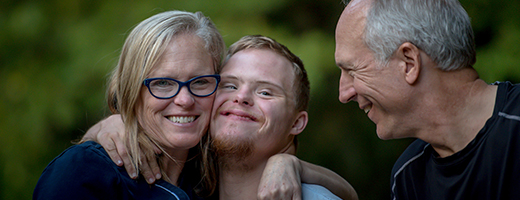My sister, Syble, was born and diagnosed with Down syndrome in 1977. Just a few years later, my mom was thinking about what my sister would do as an adult. Our small town in Duncan, Oklahoma, didn’t have a lot of resources at that time in the early eighties. But Mom had a vision for a work activity center for people with disabilities. She met with leaders in the community, family friends, and parents of adults with disabilities to see what they thought would be most helpful for their children.
In September 1980, five adults met and started working at what they called The Power Shop. There were challenges, like finding work contracts with the businesses around Duncan, and getting transportation for the adults who would work off-site at those businesses. However, The Power Shop has continued to grow and thrive, now employing one hundred twenty-one people. My mom wanted Syble and her peers to feel safe, productive, and appreciated. It’s amazing to me that the vision she had when chasing Syble and me around in 1980 (when we were both toddlers) would impact so many families and businesses in Duncan, Oklahoma, over the decades.
For parents like me, a big topic of discussion (and sometimes worry and stress) centers around what our children with disabilities and special needs will do as adults. What will the future look like for my son, James, who has autism? Is further education possible? What jobs will he be able to have? And where will he live?
I am thankful that we have generations of parents who have gone before us. Like my mom, these parents had dreams for their children and blazed a path for us to follow! We have options my mom never dreamed of! We can face the future with hope and optimism as we consider what comes next.
Here’s a list of helpful resources as you plan for your child’s next stage. The list includes college options, work programs, and housing possibilities.
- Think College is a national organization dedicated to developing, expanding, and improving inclusive higher education options for people with intellectual disabilities.
- College Autism Spectrum (CAS) is an independent organization of professionals whose purpose is to assist students with autism spectrum disorders and their families. They specialize in college counseling (helping students find the right college) and work readiness (skill building for interviews, jobs, and work skills).
- Work Incentives Planning and Assistance (WIPA) program’s goal is to enable beneficiaries with disabilities to receive accurate information and to use that information to make a successful transition to work.
- The LOMAH podcast provides information on the types of housing available to our adults with disabilities, including the family home, community care facility, campus model, and adult foster homes.
The transition to adulthood for our children with disabilities doesn’t have to be scary. They can continue to learn new skills, grow in independence, and find fulfillment. My sister’s life gives me hope when I think about my son’s future. She is a valued member of her church, she volunteers weekly at a community food pantry, and she’s the best aunt my boys could ask for. I can’t wait to see what’s next for her and for my son!
Sandra Peoples is a special-needs mom and sibling. She’s the author of Unexpected Blessings: The Joys and Possibilities of Life in a Special-Needs Family and the host of the podcast, Self Care and Soul Care for the Caregiver. You can connect with her at sandrapeoples.com.



